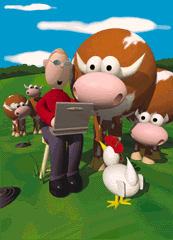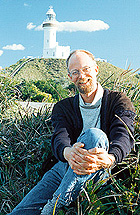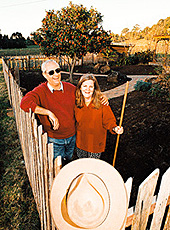'Paradise download'
This article on people
finding new ways of living in the north coast of NSW, Australia,
appeared in the Sydney Morning Herald newspaper
of July 26, 1997.
 |
The myth is that if
you leave the city, you'll be left behind. In fact, you
can have it all . . . and more. Wilson da Silva
meets the techno dropouts, online to California one
minute, milking the cows the next.
Photographs
by
David Hunt
|
Sam
Elliott, a software programmer, and Gatya Kelly, a
desktop publisher, on the veranda of their 1912 homestead
at Billinudgel.
|
 |
Picture the scene. There are two highly successful
professionals. They don't wear suits, they don't drive to
work, they don't feed parking meters. They live together and
work together, but they are not in a home office in the
'burbs, juggling work with mowing the lawn and cleaning out
the pool. Hell, they don't even have a television.
What they have are cows, geese and an organic farm north
of Byron Bay. Living in a 1912 homestead surrounded by 20
hectares of verdant hills and sub-tropical rainforest, they
split their time between doing jobs for clients in the Big
Smoke and feeding geese or making camembert.
Sam Elliott is a mathematician, trained at Harvard. He
writes software management systems for corporations around
the country. Gatya Kelly is a computer programming dropout
who has gone creative and now designs brochures, magazines
and book covers.
"Life itself is so enjoyable, doing it this
way," says Elliott in a slow, measured tone, as he puts
down his mug of tea. "The whole nine-to-five mentality
just disappears."
An amiable and youthful-looking 49-year-old with greying
shoulder-length hair, he was once a programmer for Lloyd's
merchant bank and architects Rice Daubney in Sydney. Now, he
and Kelly grow avocados, lychees and bananas, and manage a
new plantation of 1,100 trees of rainforest timber on a
property at Billinudgel, 22 kilometres north of Byron Bay.
That's when he's not writing software for his main client,
Morgan Expo-Hire, which has a lion's share of exhibitions at
Darling Harbour.
Kelly was a database programmer for I.P. Sharp, a
cutting-edge Canadian company that developed and ran
electronic mail and online commerce for corporations at a
time when the Internet was strictly a science and military
affair. In fact, that's how she and Elliott met - exchanging
e-mail while he worked at Lloyd's.
"There's a stunning lack of [local] interest in what
we do," says Kelly, both puzzled and thankful that her
rural neighbours keep so diligently to themselves.
Elliott and Kelly are telecommuters. Thanks to a host of
technologies the latest computer hardware and software,
scanners, Zip drives, fast Internet connections, faxes and
mobile phones a whole new generation is able to do the kind
of job that once required living under the smoggy skies of
the city. The kind of job that once had these people fighting
traffic, donning suits and getting up with alarm clocks. Now
they are awoken by sunlight or the plaintive calls of the
cows waiting to be milked, and the only bustle they
experience is when it's time to feed the 30 or so geese.
In city terms, their lives seem richer and less
complicated. There's no shortage of hard yakka - firewood to
cut, plantations to run, animals to keep but time ebbs with
the natural light rather than marches to the beep of a
digital clock as it did for them in Balmain five years ago.
"Fulfilling?" Elliott grins at the question as
the light fades across the valley behind him. "Yeah. I
would never go back to Sydney."
 |
Filmmaker Ron
Tanner: armed with an e-mail address and a mobile
phone, he can pull together a cast and crew in Borneo
or Brisbane. |
If there is one place where the dream of the electronic
cottage is coming alive in Australia, Byron Bay is it. The
township of 27,000 and the surrounding panoramic hills and
valleys are a Mecca to city slickers who want to drop out of
the rat race - but still stay tuned in. Some are even finding
that rather than losing touch, they are developing new
contacts and markets.
Take Ron Tanner. On the birth of his third child, the
executive producer of the Sacred Sex films and one-time
financial manager quit Sydney and headed north.
"What was really important for us was the environment
we wanted to bring the children up in," he says.
"Initially, I had no idea how I would maintain my
business in Sydney and come up here and work, and for the
first year I travelled enormously to maintain the flow of
work from Sydney and still work here."
The former Balgowlah resident found that once in Byron, he
underwent a paradigm shift. Tanner realised that he didn't
have to be in the city to pull together a film project:
whether he was shooting in Borneo or Brisbane, so long as he
was armed with an e-mail address and a mobile phone, he could
pull together a cast and crew from the comfort of his beach
house. The penny dropped. Once he mentally disengaged
geography from the equation, he found himself cutting deals
in Italy and North America as easily as he did in Sydney.
"The subject matter doesn't exist in cities in the
first place, it exists on a worldwide basis," he says,
sipping a fruit juice in his virtual courtyard office at The
Byronian cafe. "In North America they are just so far
ahead in telecommuting. People I deal with are in Carmel,
California, or somewhere in Arizona. There's no judgment made
on where you operate your business. So I realised I didn't
have to be in the city to create the work."
However, he did need the personal contacts. Like many
telecommuters in the emerging electronic nirvana of Byron's
hillsides, Tanner found that you have to make it in the Big
Smoke before quitting it. It's all about networking: you have
to be known in your field or your industry, so you can pull
all those contacts with you when you leave. Having a rapport
with people in the city allows you to pick up a phone and
close a deal. But it also requires the occasional
face-to-face contact to reinforce the link.
"Successful business is built on personal
relationships, and that's maintained with
communication," says Tanner. "But you have to be
prepared to travel to make the flesh contact; people still
want to see you."
Telecommuting is about technology. But it is also about
the fortysomething crowd cutting loose. Many have lived the
hectic life of the megalopolis and, with their careers
established, found it wanting. But thanks to the technology,
they can go bush without going redneck.
And it's not just the technology that keeps them plugged
in to the global village: in a place such as Byron, you find
fancy stores with Alessi homewares, and cafes that gurgle
with the sound of real espressos. While residents - locals as
well as new arrivals - are against big development, they do
have city tastes and city wants. In a sense, the
telecommuters are changing Byron Bay as much as it has
changed them.
"We're basically city people," says Christobel
Munson, a former Canberra Times journalist and
corporate publicist, who has worked from Hong Kong and New
York to Israel and India. "We wanted to see if we could
continue doing what we do, but from out here."
| Christopher
Sanderson, an Internet systems designer, and
Christobel Munson, a journalist and publicist, take
advantage of technology to work away from the rat
race. |
 |
"Out here" is Jindibah, a 45-hectare farm with
rolling hills and stone walls, lush foliage and a sweeping
vista of the sea. Munson and her Scottish-born partner,
Christopher Sanderson, are building a community of their own:
a sparse hamlet of 12 houses made up of ex-city folk. A third
of the land will be used for the cultivation of macadamias
and mangoes in order to pay for the upkeep of the property.
Cattle will roam the hills to keep the grass in check, and
there'll be communal spaces such as walking tracks and
swimming ponds dotted throughout.
But it will also be a hive of electronic cottages: homes
linked via phone lines to all corners of the globe, and yet
its residents interacting with each other at a personal,
village level. This is known as an "intentional
community", a movement that is gaining in popularity
among baby boomers overseas. It is, perhaps, Marshall
McLuhan's vision of a true global village come alive.
And the city slickers are succeeding, although it took
Munson and Sanderson two years for a suspicious Byron Shire
Council to authorise their multiple occupancy application.
Sanderson, a systems analyst and former senior executive,
says the notion of "intentional communities" is a
novel one, even for fashionable, new-wave Byron Bay. Now an
Internet systems designer and publisher, he is developing
business in the cities as well as helping Byron Bay become
more plugged in.
"The myth is that if you leave the city, you will be
left behind," says Sanderson. "You can run a
business from the country as well as in the city, because of
telecommunications. In fact, you can do it better."
As he spoke, the telephone rang. A Tasmanian health food
store ordering Swiss vegetable bouillon, for which Sanderson
is the importing agent. He took the order, then sat down with
another plunger of coffee as galahs began to call out in the
paddock.
"People have seized the moment, and they are
determining the future they want to live."
The hills around Byron are full of programmers, musicians,
filmmakers and writers who are telecommuting, who have found
a way of drawing work from the cities while living more
serene country lives. Here you will find jazz singer Grace
Knight, film-maker David Bradbury, as well as a shy
stockbroker who buys and sells international securities from
his farm in Wilson's Valley.
There are physiotherapists who write reports for personal
injury cases from a farm cottage, or executives such as
Richard Heale, a computer consultant and former lecturer in
human resources, who is preparing to move to Byron and still
work for his employer, Fujitsu.
"I absolutely loathe the time I spend in traffic in
the city," he says. "For me, Byron has an
atmosphere, a spiritual and cultural feel about it that
encourages you to think clearly. That's what we don't have
time for in the nine-to-five mentality of the city: the time
to think. I get a hell of a lot more done in that
environment."
Return to 'Country Life Stories'



